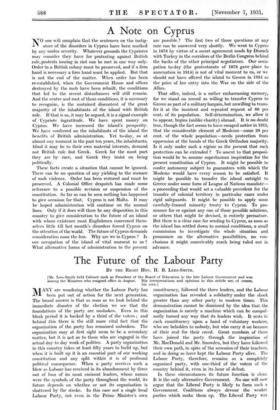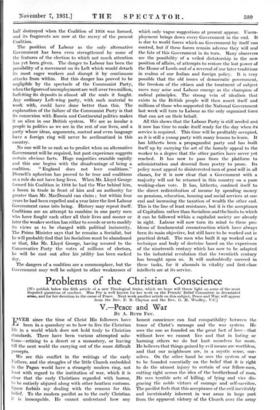The Future of the Labour Party
BY THE RIGHT HON. H. B. LEES-SMITH.
[Mr. Lees-Smith held Cabinet rank as President of the Board of Education in the late Labour Government and was among the Ministers who resigned office in August. His interpretations and opinions in this article are, of course, his own.]
MANY are wondering whether the Labour Party has been put out of action for the next generation. The broad answer is that as soon as we look behind the immediate disaster of the election we see that the foundations of the party are unshaken. Even in this bleak period it is backed by a third of the voters ; and behind this there is the still more vital fact that the organization of the party has remained unbroken. The organization may at first sight seem to be a secondary matter, but it is not so to those who are engaged in the actual day to day work of politics. A party organization in this country takes at least fifty years to build up, but when it is built up it is an essential part of our working constitution and any split within it is of profound political consequence. When a party receives such a blow as Labour has received in its abandonment by three out of four of its most eminent leaders, whose names were the symbols of the party throughout the world, its future depends on whether or not its organization is shattered by the stroke. In this case not a single local Labour Party, not even in the Prime Minister's own constituency, followed the three leaders, and the Labour organization has revealed a solidarity under the shock greater than any other party in modern times. This demonstration cannot be dismissed by the idea that the organization is merely a machine which can be compul- sorily turned any way that its leaders wish. It rests in each constituency upon a band of voluntary workers, who are beholden to nobody, but who carry it on because of their zeal for their creed. Great numbers of them have joined the party through the inspiration of Mr. MacDonald and Mr. Snowden, but they have followed their own path, in spite of the secession of their teachers, and in doing so have kept the Labour Party alive. The Labour Party, therefore, remains as a completely organized party, with one-third of the voters of the country behind it, even in its hour of defeat.
In these circumstances its future function is clear. It is the only alternative Government. No one will now argue that the Liberal Party is likely to form such a Government. Coalitions always devour the - weaker parties which make them up. The Liberal Party was half destroyed when the Coalition of 1918 was formed, and its fragments are now at the mercy of the present Coalition.
The position of Labour as the only alternative Government has been even strengthened by some of the features of the election to which not much attention has yet been given. The danger to Labour has been the possibility of a movement on its Left which would detach its most eager workers and disrupt it by continuous attacks from within. But this danger has proved to be negligible by the spectacle of the Communist Party, when the figures of unemployment are well over two million, forfeiting its deposits in almost all the seats it fought. Any ordinary Left-wing party, with such material to work with, could have done better than this. The explanation of the failure of the Communist Party is that its connexion with Russia and Continental politics makes it an alien in our British system. We are as insular a people in politics as we are in the rest of our lives, and a party whose ideas, arguments, control and even language have a foreign ring will never be acclimatized in this country.
No one will be so rash as to predict when an alternative Government will be required, but past experience suggests certain obvious facts. Huge majorities crumble rapidly and this one begins with the disadvantage of being a coalition. " England does not love coalitions." Disraeli's aphorism has proved to be true and coalitions as a rule do not have long lives. When Mr. Lloyd George formed his Coalition in 1918 he had the War behind him, a boom in trade in front of him and an authority far greater than Mr. MacDonald can claim ; but within four years he had been expelled and a year later the first Labour Government came into being. History may repeat itself. Coalitions are an attempt to combine in one party men who have fought each other all their lives and sooner or later the weaker section has either to secede or so to modify its views as to be charged with political insincerity. The Prime Minister says that he remains a Socialist, but he will probably find that his Socialism must be abandoned or that, like Mr. Lloyd George, having secured to the Conservative Party the votes of millions of electors, he will be cast out after his utility has been sucked dry.
The dangers of a coalition are a commonplace, but the Government may well be subject to other weaknesses of which only vague suggestions at present appear. Unem- ployment brings down every Government in the end. It is due to world forces which no Government by itself can control, but if these forces remain adverse they will seal the fate of this Government in its turn. Many observers see the possibility of a veiled dictatorship in the new position of affairs, of attempts to restore the lost power of the House of Lords and of a reversal of our later traditions in realms of our Indian and foreign policy. It is very possible that the old issues of democratic government, the freedom of the citizen and the treatment of subject races may arise and Labour emerge as the champion of radical principles. The strong vein of idealism that exists in the British people will then assert itself and millions of those who supported the National Government last week will turn to Labour as the only organized force that can act on their behalf.
All this shows that the Labour Party is still needed and it now has time to make itself ready for the day when its service is required. This time will be profitably occupied, as it is still a young party with many lessons to learn. It has hitherto been a propagandist party and has built itself up by carrying the art of the homely appeal to the worker to a degree that the other parties have never yet reached. It has now to pass from the platform to administration and descend from poetry to prose. Its policy must appeal to disinterested men of good will in all classes, for it is now clear that a Government with a majority will not be returned in this country on a pure working-class vote. It has, hitherto, confined itself to the direct redistribution of income by spending money on pensions, education, housing and social services at one end and increasing the taxation of wealth the other end. This is the line of least resistance, but it is the acceptance of Capitalism rather than Socialism and the limits to which it can be followed within a capitalist society are already in sight. Labour will now turn its mind to these pro- blems of fundamental reconstruction which have always been its main objective, but still have to be worked out in practical detail. The men who built it up worked out a technique and body of doctrine based on the experience of the nineteenth century which has now to be adapted to the industrial revolution that the twentieth century has brought upon us. It will undoubtedly succeed in these tasks, for it abounds in vitality and first-class intellects are at its service.















































 Previous page
Previous page